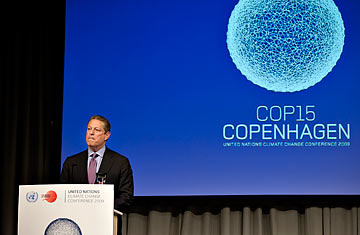
Former U.S. Vice President Al Gore addresses the Copenhagen Climate Change Conference on Dec. 15, 2009
When President Obama hammered out an agreement with leaders of China, India, Brazil and South Africa in the waning hours of the U.N.'s climate-change summit in Copenhagen in December, they saved the long-running global-warming negotiation process from total disintegration.
But it may have been just a stay of execution.
The U.N. Framework Convention on Climate Change (UNFCCC) gave all nations until Jan. 31 to sign onto the deal — in part because it was opposed by a handful of small countries — and to publicize the domestic actions they are willing to take to reduce carbon emissions.
Despite some wavering, key developing nations including China and India pledged their support for the deal, known as the Copenhagen Accord, by the deadline, reiterating their domestic plans to curb the growth of carbon emissions by improving energy efficiency. Europe, reliably, came on board with a promise to cut carbon emissions 20% below 1990 levels by 2020. And the U.S. confirmed its Copenhagen pledge to reduce its own emissions 17% below 2005 levels by 2020.
Taken at face value, the accord pledges demonstrate an international will to act on global warming and energy, even in the absence of a true international treaty. "All the major economies are off and running," says Keya Chatterjee, acting director of the U.S. World Wildlife Fund's climate-change program.
But that's the optimistic view. The reality is that even though governments at Copenhagen agreed to keep global temperatures from rising more than 2°C this century, the carbon-emissions cuts they've promised are not nearly steep enough to achieve that goal. And while tens of billions of dollars have been pledged to help developing nations cut carbon and adapt to climate change, the mechanism for delivering that money isn't clear yet.
It's also looking unlikely that the U.S. Senate will pass carbon-capping legislation anytime soon — Obama lost a key vote for cap and trade when Republican Scott Brown won the late Senator Ted Kennedy's seat in a special election in Massachusetts — and that could potentially invalidate the U.S. Copenhagen pledge and throw the continuing international climate talks into further disarray. "Unless [the U.S.] is serious about its own commitments, there will be a very serious impact on the talks," said Rae Kwon Chung, South Korea's ambassador on climate change.
So the story remains largely the same: the world is waiting on the U.S. Signals from the Administration suggest they may be waiting a while, though, at least when it comes to a hard carbon cap. Although Obama called for comprehensive climate and energy legislation in his recent State of the Union address, there was one term he did not use: carbon cap. And in its proposed budget for fiscal year 2011, released on Monday, the White House did not name a specific dollar figure for revenue it expects from cap and trade. Last year's budget projected $79 billion in revenue from the auction of carbon credits by 2012.
While climate legislation isn't dead by any means — it still has powerful supporters on Capitol Hill, including Republican Senator Lindsey Graham — it faces an uphill battle in an election year. As a defense of last resort, the Environmental Protection Agency has the authority to regulate carbon emissions directly, but that logistically sticky tack is one Obama has repeatedly said he'd rather not use. "There's increasing concern that if we don't get it together in the U.S., we will lose the clean-energy markets and jobs and growth that come with [a carbon cap]," says David Doniger, policy director at the Natural Resources Defense Council's climate center.
Meanwhile, international negotiations will continue this year, culminating again in the annual U.N. climate summit at year's end, to be held in Cancún, Mexico, in November. (At the very least, if thousands of attendees are forced to wait in line outside for hours, as they were in Copenhagen, they'll get a nice tan.) Further complicating any attempt at progress is the growing sense that the U.N. process itself needs to be overhauled, especially after a handful of obstructionist countries managed to slow the Copenhagen negotiations to a crawl.
A month and a half after Copenhagen, the world finds itself in much the same place it has been for over a decade, still talking about the need to strike a grand global climate bargain. "It's fair to say that Copenhagen did not produce the full agreement the world needs to address the collective climate challenge," UNFCCC executive secretary Yvo de Boer told reporters on Jan. 20. "The window of opportunity to come to grips with the issue is closing at the same rate as before." At a minimum, the response to the Copenhagen Accord showed that the most powerful nations in the world want to do something about climate change. It's just not clear they want to do it together.
